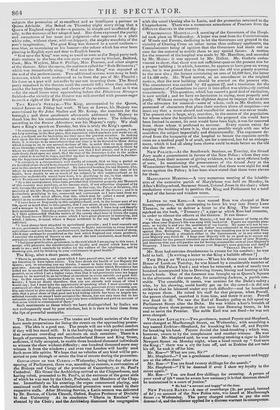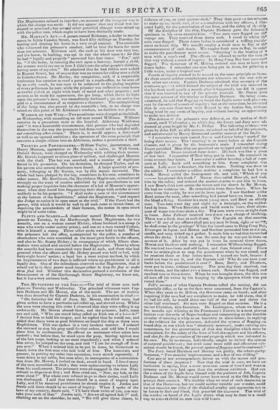LETTER TO TIIE KING.—A man named Ross was charged at
Bow Street, yesterday, with attempting to force his Way into Drury Lane Theatre, in order to deliver a letter to the King. The letter was *asked on the back, " Treaaury -", a,rosestp which Ross had recourse, in order to silence the officers at the theatre. It ran thus- " To the King's Most Excellent Illajesty,--q had the honour of being on the stage when your Majesty's life was sung with loud eclat. It gave me supreme plea- sure, as loyalty is and was the sentiment of my fatnily. My name will not be un- known to the Duke of Sussex, as my father was concerned in the proceedings against Mrs. Billington. The purport of my thus troubling you is to solicit from your Majesty's hands a situation either in the Government, or in any other way your Majesty may think St I hope your Majesty will be so good as to excuse my presumption for the present intrusion upon the time and pleasure of your Majesty, and likewise that you will pardon me for having assumed the style of your Majesty's Treasury. I have the honour to remain your Majesty's most gracious and dutiful servant,
"TROMAS DRURY ROSS."
Mr. Ross had extreme drunkenness in excuse for his conduct : he was held to bail. [Is writing a letter to the King a bailable offence?] --
THE DUKE or WELLissoroso—When his Grace went down to the House of Lords on Tuesday, he was hissed by a considerable number of idlers in Old Palace Yard ; and when he returned, a mob of nearly two hundred accompanied him to Downing Street, hissing and hooting at his horse's heels. One of the foremost was brought up at Queen's Square in the afternoon of the same day, for assaulting Jackson, a parish con- stable. The constable, it seems, was anxious for the Duke's safety ; who, by his showing, could hardly get on for the crowd—it did not strike us that he laboured under any such difficulty—and he interfered to repress them. He raised his staff for that purpose, when Powell. the person charged, snatched it from him, and threw it away. Powell was fined in 3/. We saw the Earl of Rosslyn gallop at full speed up Parliament Street after the Duke. He was within a hair's breadth of running down three persons at the turn into Downing Street, in his zeal to assist the Premier. The noble Earl was not fined—he was not even charged.
VIOLENT LOYALTY.—TWO gentlemen, named Poyntz and Shepherd, were charged at Marlborough Street, on 1Vednesday, with assaulting a boy named Erskine—Shepherd, for knocking his hat off, and Poyntz for breaking his head. Poyntz denied the head-breaking ; which was, however, sworn to by the complainant and another witness. He was fined 5/. Mr. Shepherd said, he was standing smoking a cigar in Little Newport Street on Monday night, when a band struck up "God save the King ;" there was a cry for hats off, and as Erskine did not take his off, he took it off for him.
Mr. Roe—" What are you, Sir ?" Mr. Shepherd—" I am a gentleman of fortune ; my servant and buggy are at the office-door."
Mr. Roe—" You are fined twenty shillings for the assault."
Mr. Shepherd—" I'll be damned if ever I show my loyalty in the street again." Mr. Roe—" You are fined five shillings for swearing. A person of your rank of life* must be aware how necessary it is that decorum should be maintained in a court of justice."
• He had "a servant and buggy" at the door. NEW POLICE RATES.—A case of overcharge (2s. per pound, instead of 8d) on account of the New Police rate, was heard at Marlborough Street en Wednesday. The party charged refused to pay the sum demanded, and the collector applied for a distress warrant inconsequence.
The Magistrates refused te interfere, on account of the irregular way in which the charge was made. It did not appear that any fraud was me- ditated or practised ; but seviatal other parochial charges were mixed up with the police rate, which ought to have been distinctly made.
Mn. MARTIN'S Acr.—A person named Kirkman, a dealer in marine stores in Little Camden Street, was fined fifty shillings on Tuesday, for beating and abusing his horse in a very cruel manner. The constable who witnessed the prisoner's conduct, said he beat the horse for more than ten minutes. Kirkman said, the curb at his door was very low, and the horse, in backing, was apt to run the wheel upon it : for this he had " legally and properly" corrected him four times. " For," said he, " if the horse in running the cart upon a footway, hurted a child, the women would out as how I didn't care for other people's children, having none of my own." He admitted that he had ridden over a child in Regent Street, but of course that was no reason for riding over a child in Camden Street. Mr. Morley, the complainer, said, if a respectable tradesman has occasion to send a parcel to a coach-office, to be sent off by an early coach, he was sure to be subjected to the prying inquiries of every policeman he met; while the prisoner was suffered to come home at twelve o'clock at night with loads of metal and other property ; and as soon as he made his appearance, the gas lamp, which threw its light upon the priSoner's door, was immediately darkened ; yet no notice was paid to a circumstance Of so suspicious a character. The extinguishing of the lamp was also proved by the constable ; but, as no charge was .7 raised on this point of Mr. Kirkman's conduct, no decision was given.
WISDOM OF THE WISE.—TWO prostitutes were charged at Guildhall, on Wednesday, with assaulting an old man named Williams. Williams remains in a precarious state at the hospital. Alderman Waitliman said "it was a lamentable circumstance, that persons who had degraded themselves in the way the prisoners had done could not be satisfied with- out committing other crimes." There is, it would appear, a. downward as well as an upwardambition ; the operation of the same principle that converts a simple citizen into an Alderman, makes a prostitute a thief.
THIEVES AND PawrenitoxEns.—William Taylor, journeyman, and Henry Measom, apprentice to Mr. Gerais, a tailor, in Well Street, Oxford Street, were charged on Wednesday with robbing their master. Mr. Garnis happened to miss a piece of toilinet, and challenged Measom with the theft. The boy was searched, and a number of duplicates found in his possession. On his detection, he charged Taylor, and on his person also several duplicates were found. A large quantity of pro- perty, belonging to Mr. Garnis, was by this means recovered. The whole had been pledged by the boy, sometimes in his own, sometimes in other names. Mr. Rawlinson, the Marylebone Magistrate, animadverted strongly on the want of caution exhibited by the pawnbrokers in not making proper inquiries into the character of a lad of bleasom's appear- ance, when they found him frequenting their shops with articles so very unlikely to be his property. "I shall make a note of the circumstance at the bottom of the depositions," added the Magistrate, "and request the Judge to notice it in open court at the trial. If the Court had the power, with which it would be' well in all such cases to invest them, of depriving the pawnbrokers of their licences, the notice in open court'
might be of some value. '
FLINTS AND Scaruns.—A shoemaker named Dobson was fined six pounds on Tuesday, by the Marlborough Street Magistrates, for two assaults, one on a woman named Hickey, whose husband is a scamp (a man who works under society prices), and one on a man named Cashen, who is himself a scamp. Three other snobs were held to bail. When the prisoners left the office, accompanied by the police, a number of shoemakers who were assembled at the doors gave battle to the officers, and also to Mr. Scamp Hickey; in consequence of which fifteen shoe- makers were seized and carried before the Magistrates. Those by whom the assaults had been committed were tined 51. each, and those who had groaned when the officers and Mr. Hickey passed was held to bail, with forty-eight hours' notice; a legal but a most unjust method, by which an imprisonment of two days is inflicted where no punishment at all is legally due. One of the defendants observed to the Magistrates, that it would not be in their power much longer either to levy the fine or make them find bail. Whether this declaration portend a revolution of the Government or of the Marlborough Street Magistracy, we know not, but it has a very ominous look.



























 Previous page
Previous page